 Petzlover
Petzlover Bengal is originated from United States but Cymric is originated from United Kingdom. Both Bengal and Cymric are having almost same weight. Both Bengal and Cymric has almost same life span. Bengal may have more litter size than Cymric. Both Bengal and Cymric requires Moderate Maintenance.
Bengal is originated from United States but Cymric is originated from United Kingdom. Both Bengal and Cymric are having almost same weight. Both Bengal and Cymric has almost same life span. Bengal may have more litter size than Cymric. Both Bengal and Cymric requires Moderate Maintenance.
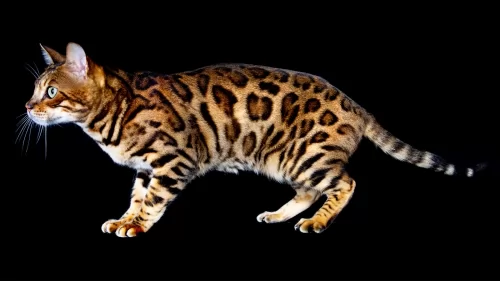 What an exquisite coat the Bengal cat has. It looks like the coat of a wild cat and can have spots, marbling, and rosettes, but it is domesticated, developed from hybrids – the spotted Egyptian Mau and the Asian Leopard cat.
What an exquisite coat the Bengal cat has. It looks like the coat of a wild cat and can have spots, marbling, and rosettes, but it is domesticated, developed from hybrids – the spotted Egyptian Mau and the Asian Leopard cat.
It is the only domestic breed of cat that has rosette markings. It is Jean Mill of California that you associate the Bengal cat with, and she conducted a number of graduate classes in genetics.
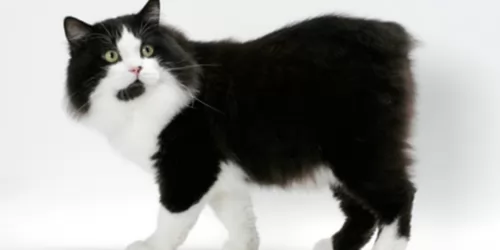 The Cymric is a naturally tailless cat although having said that, not every Cymric is completely tailless.
The Cymric is a naturally tailless cat although having said that, not every Cymric is completely tailless.
It’s actually a long-haired Manx cat this and thought to date back to 1750. It is one of the oldest cat breeds.
Known also as rumpies or stumpies, the taillessness of the Manx an Cymric started as a mutation among the island's domestic cat population. Long-haired kittens were born to Manx cats on the Isle of Man, but in the 1960s, similar kittens were born in Canada and then specifically bred.
The Cymric became popular, even though it took years for the Cymric to be recognized as a breed of its own by cat associations. The International Cat Association (TICA) gave the cat breed status in 1979.
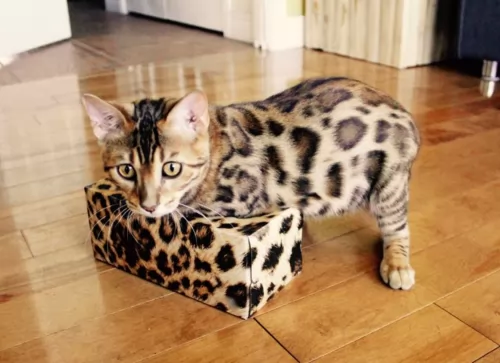 The Bengal looks like a wild cat and it can weigh up to 7kg. It can reach a height of 70cm with long, muscular legs and almond-shaped eyes which are green or blue.
The Bengal looks like a wild cat and it can weigh up to 7kg. It can reach a height of 70cm with long, muscular legs and almond-shaped eyes which are green or blue.
When it comes to the coat of the Bengal cat, it has a wide variety of colors and patterns. The cat can be brown, black, red, grey, spotted, clouded, ticked or rosette.
There are Bengal breeders that claim that their Bengals are hypoallergenic so that they won’t cause an allergic reaction with their owers. This is something that hasn’t been scientifically proved and in fact many will say that there isn’t such as thing as a hypoallergenic cat.
The Bengal is a medium to large-sized cat, being long and lean and muscular. As a low shedder, it is believed the Bengal is a hypoallergenic cat breed – a cat less likely to cause an allergy with its human owners.
When you bring a Bengal cat into your home, you’ll find they are energetic, smart, and playful and they love cavorting around in water.
People who have owned a Bengal say that the cat is friendly and that it enjoys interacting with humans. They’re cats capable of forming strong bonds with their human family, becoming affectionate and loyal. They in turn want to receive lots of loving attention.
They’re intelligent too and are quick to learn. You have to remember that these are part wild cat and that they are only classed as tame from the 4th generation (T4).
The cat has wild traits so it is only natural that it likes to hunt so don’t be alarmed when your Bengal presents you with dead mice, moles, and birds.
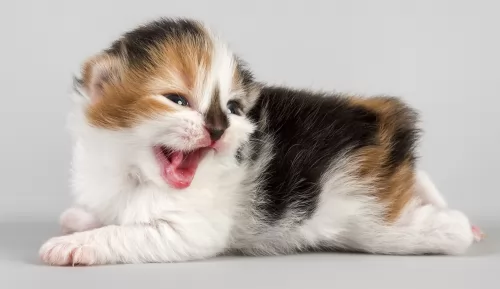 The Cymric is a medium-sized cat that can weight between 4 and 6kg and he is round in shape and stockily built. The back legs are also longer than the front legs.
The Cymric is a medium-sized cat that can weight between 4 and 6kg and he is round in shape and stockily built. The back legs are also longer than the front legs.
He has a short, arched back with a broad rump. The unusual but beautiful Cymric has long hair and a thick double coat that is glossy and vibrant. Some cymrics have tufts of hair on their ears and toes.
All colors of the coat are available and it can be solid or patterned - white, blue, red, black, cream, tortoiseshell etc.
The eyes are large and can be green, copper, or yellow. The ears are widely spaced with rounded tips.
The Cymric is described as a sweet-natured, placid cat that doesn’t get ruffled over much, though he does get excited about his human family.
He tends to be reserved around strangers. He is a loving cat and simply loves being around his human family. He is a strong cat and intelligent too and he is quite capable of watching you and then learning how to open doors and get into cupboards.
He is sociable and talkative too and enjoys ‘talking’ to you, especially when he has attached himself to one member of the family. He thrives on his human family's company and is a cat that provides lots of entertainment for you. Even though he becomes attached to one family member, he gets on well with children and pets in the home.
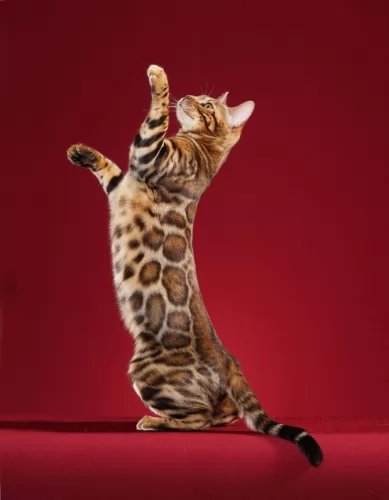 Bengal cats are intelligent and just like a dog he is clever at learning tricks and can even be taught things such as ‘sit’, ‘fetch’ or ‘lie down’. They actually make great companions as they are sensitive to their owner's moods and can even recognize human gestures and adapt their behavior to their owner's mood.
Bengal cats are intelligent and just like a dog he is clever at learning tricks and can even be taught things such as ‘sit’, ‘fetch’ or ‘lie down’. They actually make great companions as they are sensitive to their owner's moods and can even recognize human gestures and adapt their behavior to their owner's mood.
They’re vocal cats too and they like to communicate about their needs, being able to meow in different tones. They’re active cats and they want active owners – those who can spend time with them playing and even going on walks and hikes.
The Bengal certainly is a wonderfully companionable cat.
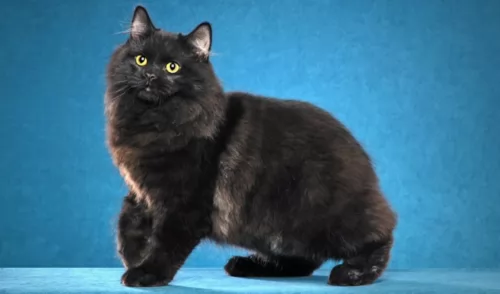 Yes, the Cymric has quite a few health issues but many people choose to overlook these as they love the personality of the lovable cat breed.
Yes, the Cymric has quite a few health issues but many people choose to overlook these as they love the personality of the lovable cat breed.
It’s such an intelligent cat too but best of all it offers total love and companionship.
It is certainly an unusual domesticated cat breed that appeals to many different people and it is guaranteed that you’ll also find him one hang of a feline pet.
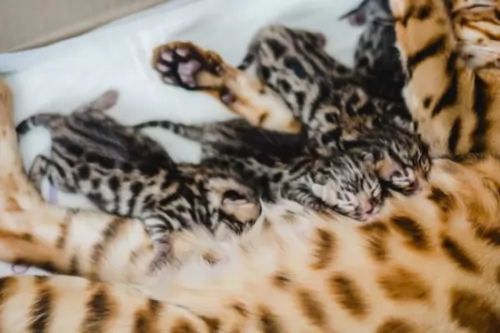 Hypertrophic cardiomyopathy (HCM) is a concern with the Bengal cat breed and this is a disease where the heart muscle becomes thick and unable to pump blood properly.
Hypertrophic cardiomyopathy (HCM) is a concern with the Bengal cat breed and this is a disease where the heart muscle becomes thick and unable to pump blood properly.
It’s a common genetic disease in Bengal cats. Cats used for breeding need to be screened each year to ensure no hypertrophic cardiomyopathy is present.
Another problem with the Bengal cat is Progressive retinal atrophy or PRA. Anyone wanting to breed Bengals should have their cat tested for this eye disease as the disease can lead to blindness.
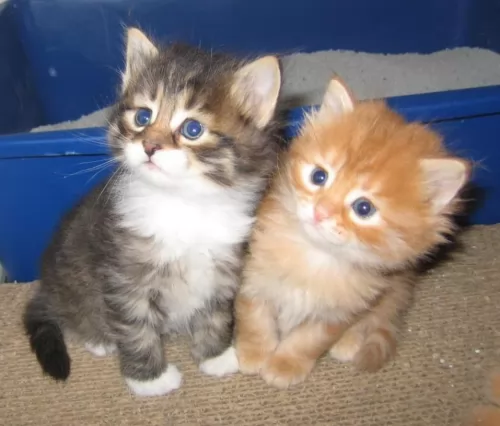 If you look after your Cymric well, he can live to a good age of up to 15 years. The lack of a tail is a genetic defect and the cat’s deformed spine can cause health problems including arthritis.
If you look after your Cymric well, he can live to a good age of up to 15 years. The lack of a tail is a genetic defect and the cat’s deformed spine can cause health problems including arthritis.
In fact, the cat’s lack of a tail causes some serious diseases. The defective gene responsible for the loss of the tail affects the spine and can actually cause spinal problems. In fact, when completely tailless Manx cats mate, the defects can be so severe that some of the offspring are born dead.
People often speak of these health issues of the cat as the Manx Syndrome.
Some cats have a narrowing of the anal passage and this can lead to bowel blockages. Make sure to get your Cymric vaccinated against deadly cat illnesses and ensure veterinary checks for parasite control and illness.
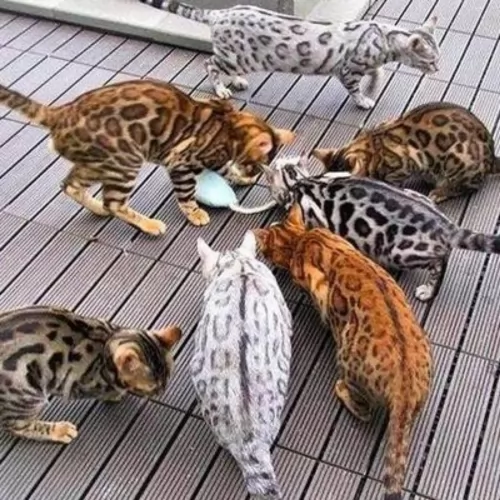 You will need a secured outdoor area for your Bengal cat where he can play and climb. He will need these for his activity levels as well as stimulating toys.
You will need a secured outdoor area for your Bengal cat where he can play and climb. He will need these for his activity levels as well as stimulating toys.
Provide feeding and water bowls and also make sure that you provide your Bengal with a shallow swimming pool as this cat loves water.
The Bengal is a healthy cat breed so it is important to provide your pet cat with the best food there is and to ensure he gets checked out at the vet every year.
Most hybrid breed owners provide raw food as these cats are often sensitive to commercially manufactured food. Having said that, there are high-quality prepared cat foods that will provide your Bengal with everything needed for a healthy life.
Look at providing your pet with a good supplement to ensure your furry friend has every chance to be healthy and happy.
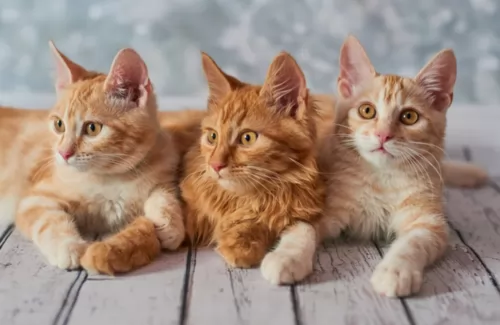 As a kitten, provide your Cymric with food appropriate to its age. Once your cat turns one, you can start feeding him adult cat food. There are a whole lot of excellent commercially manufactured cat foods – dry and canned foo – but always choose a high-quality one where the first ingredients listed are always meat. This is because the cat is a carnivore. Make sure the food has taurine, which is an essential amino acid for cats.
As a kitten, provide your Cymric with food appropriate to its age. Once your cat turns one, you can start feeding him adult cat food. There are a whole lot of excellent commercially manufactured cat foods – dry and canned foo – but always choose a high-quality one where the first ingredients listed are always meat. This is because the cat is a carnivore. Make sure the food has taurine, which is an essential amino acid for cats.
This cat has a thick coat and he will need a brush at least twice a week, especially as he is a high shedding cat. While you brush your cat, look out for any problems such as red areas, hair loss, sores or irritated skin. Take note of any unusual lumps.
Some people take their Cymric to the vet once a year for a routine medical check-up. They have the nails clipped and the ears and teeth checked. It is also a great way to get your queries answered on the nutritional and health needs of your pet.
You will need to have your Cymric’s nutrition checked to keep him in tip-top condition. The Cymric cat has a good appetite and his build can allow him to put on weight easily. Obesity can put pressure on the spine and lead to all kinds of joint problems.
Provide your cat with a litter box and keep it immaculately clean.